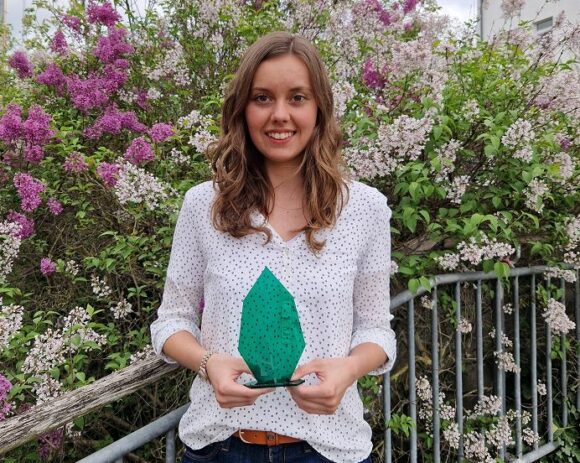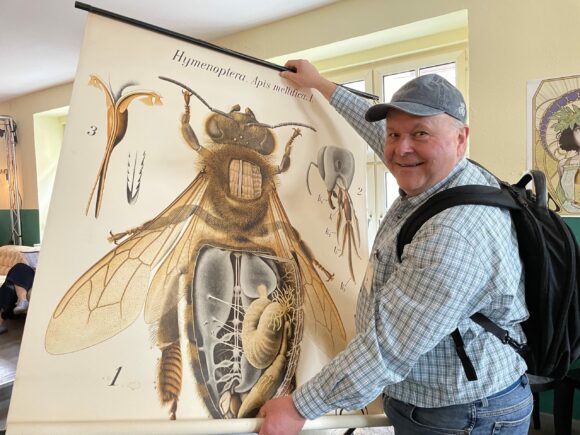He has traveled a lot around the world for his research: Ethiopian Dr. Molla Tadesse Abate from Bahir Dar University completed a joint doctoral program through Erasmus Mundus at the University of Borås (Sweden), the Politecnico di Torino (Italy) and Soochow University (China). In Germany, the postdoc has just been nominated for the Georg Forster Research Award, one of the prestigious fellowships of the Alexander von Humboldt Foundation. Since July 1, he has started his research activities at the textile site Münchberg of Hof University of Applied Sciences.

Alexander von Humboldt Foundation, on the occasion of the study tour of Fellows 2023
at the Foundation in Bonn; Photo: private;
Dr. Molla Tadesse Abate’s research deals with textile technology, more specifically with the dyeing and finishing of textile fibers. These fibers are made from recycled or bio-based polymers. “We have a good win-win situation there for all of us,” says his supervisor, Prof. Dr. Michael Rauch, who appreciates the international orientation of his new colleague:
Normally, universities of applied sciences don’t get Alexander von Humboldt fellowships, so this time is rather an exception, because the Georg von Forster research award was a perfect fit for Dr. Molla.”
Prof. Dr. Michael Rauch
And so the two researchers’ application was granted. After completing a four-month German language course in Frankfurt, the well-traveled researcher and his family came to Hof.
He has already undertaken a study trip through Germany with the new Alexander von Humboldt Fellows. During this trip, the group visited various cities and landscapes, historical sights, museums, industrial companies and research institutes, and participated in cultural programs. These included the headquarters of the Alexander von Humboldt Foundation and the House of History in Bonn, the Museum of German-German History in Mödlareuth, and many tourist highlights. “The tour helped me get to know Germany in all its facets, and I now understand much better what makes Germans tick,” says Molla. He adds that the tour of Germany made him more familiar with German culture, so that arriving in Hof is now easier for him.
Reducing water consumption
Molla wrote his doctoral thesis in Sweden at Borås University. Water is increasingly a scarce commodity, and the dyeing and finishing processes in the textile industry in particular require a lot of water:
My goal is to significantly reduce water consumption in textile dyeing and finishing and, if possible, to test other processes that do not use water at all.”
Dr. Molla Tadasse Abate
New dyeing and finishing processes
His doctoral thesis, written during his Erasmus Mundus joint doctorate, was already geared toward this goal: The key word here is the use of so-called supercritical CO2 technology. The process itself is not new; the dyeing of polyester fibers has a long tradition. What is new is that it is now being considered for dyeing and finishing other sustainable man-made fibers such as biodegradable polyesters, polyamides and PLA (i.e. polylactic acid), thus working with a sustainable feedstock. In the future, he plans to further develop and adapt this technology for other textile fibers and processes.

Molla sees the application primarily in the field of functional sportswear, where he also focuses on the antimicrobial function. “If it works, we would no longer need fresh water for such processes, no wastewater accumulation and thus no wastewater treatment,” the researcher says. This would significantly reduce the cost of freshwater use and wastewater treatment. The advantages of such a technology, he says, are thus both ecological and economic.
Three years in Upper Franconia
Molla will spend the next three years conducting research in Hof and Münchberg. In between, he will repeatedly make short research trips to Sweden to use very special equipment for his research. Will he settle down somewhere one day? “I will work wherever I find good working conditions and opportunities for my research project,” he says, but qualifies a bit: “But it shouldn’t be too cold.”
We have a close cooperation with the University in Bahir Dar in Ethiopia. Dr. Molla Tadesse Abate is the third scientist to work here with us. I myself have also attended a conference in Bahir Dar and made contacts. The textile orientation there really suits us well. By the way, the cooperation originally started with Prof. Reinhart Möckel, and I am now continuing it.”
Prof. Dr. Michael Rauch
About the scholarship
With the Georg Forster Research Awards, the Alexander von Humboldt Foundation honors researchers from emerging and developing countries. Each year, the award recognizes internationally renowned researchers working on topics relevant to development. The award winners are nominated by specialist colleagues from Germany and invited to establish or expand collaborations with them. The research award, which is endowed with 60,000 euros each, is funded by the German Federal Ministry for Economic Cooperation and Development. The Foundation maintains an interdisciplinary network of more than 30,000 Humboldtians in over 140 countries worldwide, including 59 Nobel laureates. The research award is named after the naturalist, travel writer and journalist Georg Forster (1754-1794), a friend of Alexander von Humboldt.







